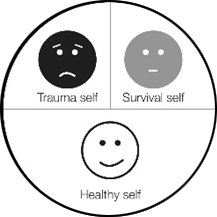|
This article appeared in the July 2020 issue of Coaching Today, which is published by the British Association for Counselling and Psychotherapy (c) BACP. https://www.bacp.co.uk/bacp-journals/coaching-today/ The military metaphors have become so common in the pandemic that we stop paying attention: it’s a ‘fight’, a ‘battle’. If so, then it’s one where the ‘war’ involves the ‘civilians’ as much as the ‘troops’. As coaches we are as much at risk as our clients and as likely to be affected by anxiety, hope, dread and sorrow as anyone we work with. This gives coaching in the time of Covid its unique challenges. In this article we explore why being trauma-aware is especially relevant at this point, what to look out for – in ourselves and in our clients.
Trauma awareness can add depth and richness to your coaching and it may be especially useful in this crisis. At the core of being trauma-informed is having clarity about what trauma is and how it manifests itself. We find the work of Professor Franz Ruppert (2014)(1) to be a helpful framework, as it is simple and yet captures the complexity of trauma. If you are unfamiliar with it, the box [below] is a summary. Professor Franz Ruppert Trauma ModelTrauma is a lasting neuro-physiological response to life threatening experience. This sense of life being threatened is a body-based response to conditions that are experienced as profoundly unsafe. This occurs in early infancy where there is insecure attachment from conception onwards. It can also occur later in life when we are in serious danger. Ruppert’s model (see figure 1) which he names ‘the split in the psyche’, offers a simple illustration of the complex response: The trauma response brings a ‘freeze and fragment’ reaction and shuts us down through dissociation. The feelings of terror, rage, shame and intense vulnerability are held within the trauma self and remain the ‘age’ at which they were experienced, so when expressed will be immature. To keep these feelings deeply repressed, we develop a survival self with a wide range of strategies. These continue to operate through life in the attempt to keep us from re-experiencing the trauma feelings. The healthy self is our innate capacity to be self-regulated. In that state we are able to face the truth clearly, make decisions for ourselves and do not need to manipulate or entangle others to get our needs met. We can tolerate our trauma feelings and are not frightened by them. It is the survival self and healthy self that we meet in coaching, in ourselves and our clients. The repressed trauma feelings are the focus of psychotherapeutic work, as is working with traumatic stress. Within individuals who are traumatised the ‘there and then’ trauma feelings are unconsciously stimulated as if the ‘here and now’ was the same situation. The core sense is of not being safe, of being at risk of hurt from others. The survival self contains different strategies including denial, control of ourselves, others and the world, use of addictive habits, depression and other signs of mental illness. It also develops a survival-attachment pattern, in response to insecure attachment as a child. When these survival parts are active and in the driving seat, we do not think clearly. We fail to assess the reality of our situation and the range of healthy resources we can draw on within ourselves to deal with that reality. See Vaughan Smith (2019) Implications for the pandemicMany of us use distraction to get away from inner pain – it is a survival strategy. The distractions we may have used previously may not be available in the same way. For all four of the clients we described at the top of this article, boundaries, necessary for feeling safe, have been disrupted. The journalist had not fully recovered physically or mentally and was shocked by having needed to be hospitalized, it had disturbed his idea of himself as fit and healthy. The social services manager was unable to protect her boundaries and the existing weaknesses in her marriage were ruthlessly exposed; she was overwhelmed by too many Zoom meetings, too many domestic responsibilities, feeling she need to be available all the time to everyone. The young teacher had developed her phobia and OCD as a response to an intensely traumatizing childhood where both her parents had been alcoholics, leaving her to manage the care of a younger brother. The pandemic recreated the intensity of the trauma she had experienced as a child: the world really was unsafe; there really were ‘germs’ everywhere. For the intensive care consultant, his difficulty in challenging senior managers reawakened the sense of impotence he had experienced as a small boy sent to boarding school far too young. What should coaches expect from clients at this time?Some coaches have raised concerns about what they should expect from clients as we move out of this situation and possibly into yet more uncertainty. Clients might be bringing unfamiliar issues, thoughts and feelings to the sessions. Our task is not to get caught up in the survival game of wanting to rescue them nor to shut them down to avoid our own anxieties. These are our own survival strategies as coaches. People whose survival strategies include work-addiction and perfectionism find rest difficult and often have poor sleep. They may also be addicted to exercise. Working from home with the family around can cause these tactics to over-heat. Clients may suffer from exhaustion and be nearer to burn-out than they were previously. The coaching focus here is: What will help you find rest? What parts of yourself can help you let go of these survival drivers? Whose help do you need? Some may need therapeutic help to get to the root causes of their survival drivers. Clients who use control as their survival strategy could be overwhelmed by the uncertainty. Their normal mechanisms for control may not be working: children interrupt, exercise can’t be done in the safe environment of the gym, who knows what their team members are up to when they are also working from home? The fear of being out of control can create high levels of anxiety. A senior civil servant client with major responsibilities described it like this: ‘All my routines are impossible. I used the long commute to create a welcome corridor between work and home. I had little rituals that helped: the coffee from Pret, the walk around St James’s Park at lunchtime, the pleasant chats with my PA. That’s all gone. Instead I have the dog, the cat, the guinea pigs, the kids, my husband, the shopping and the usual ceaseless political churn with Ministers to deal with as well!’ The frightened childFor some of us, this experience may awaken profoundly upsetting survival thoughts. The repeated use in the media of the word ‘isolation’ as in ‘self isolation’ may trigger feelings of having been isolated as a child, for instance having being hospitalised, passed through the fostering system or of being with parents who were unable to care for us. People who live alone may feel vulnerable where the lockdown experience reawakens early trauma. A good question here might be ‘How am I isolating myself now?’ If we feel uncared for in the present we may be identifying with times in the past when we were uncared for. The question here might be, ‘How am I failing to care for myself now?’ A client struggling to keep his business alive during the most intense lockdown phase found that he was once more using alcohol as his crutch, sleeping badly, reverting to an earlier style of working where he had found delegation difficult. The coach’s question here was, ‘How might you make looking after yourself the priority here?’ Letting go of guiltSome people, coaches and clients alike, have enjoyed the lockdown experience. They have no financial worries, they are relieved that they longer have to perform for others or seek their approval. They have relished the long walks in pleasant weather, they fall into the low risk category. Some have felt guilty about this enjoyment. The reality is that it isn’t either/or. We can feel privileged and compassionate for those who are not so lucky. The ‘shoulds’ are the clue to these being the equivalent of ‘parental injunctions’. The pandemic has exposed divisions and differences in the society we have helped create. Guilt is only useful if it triggers something we need to learn about how our action has transgressed our value system. Feel it, note it, move on. We need to be sure that whatever actions we take come from our healthy self and that it isn’t a reaction from the needs of our survival self for validation or rescuing. This was true for a previously hard-pressed Chief Executive who found that much of her charity’s work could be done remotely, and much of it without her. This prompted the question, ‘What would I rather have from now on, if I could have it?’ Some clients will have found new energies and capabilities through entrepreneurial or community focused participation. They might be energised and excited about how to take that into the next phase of their lives. One coach offered training and technical help on remote working to his local volunteer organisation. This was so successful and rewarding that he has decided to commit 30% of his working time to this organisation for the foreseeable future. Looking after yourselfAs coaches we need to attend to our own well-being. This means using knowing how to calm and regulate our breathing, to shut down negative thinking, to connect with our body and felt experience. Mindfulness, meditation, yoga, deep breathing exercises, walking, running, painting or image-making, keeping a reflective journal and being with nature – all of these may help. Don’t hesitate to consider coaching, extra supervision, counselling or therapy for yourself if you feel you may need more support as we move through and out of this crisis and possibly into new waves of it. If we can stay in our healthy selves most of the time, we can be with our clients in whatever the challenges they bring to us. We don’t need special ‘techniques’Coaches often ask us whether you need a unique trauma-aware set of tools and techniques. The answer is no. You don’t need any special pandemic-specific tools and techniques either. Your normal coaching skills, see Rogers (2016) (4) will be more than enough. Clients are not looking to us to reform or give them answers. Some approaches we have found useful include:
SummaryWhat we know is that all our clients will have a unique response to the situation. This will be a combination of their trauma history, survival and attachment patterns, and the actual reality in the here and now. Recovery will take time. For some it will be longer than for others. However, this experience is in our system and we will carry aspects of it with us for a while. Recovery is not to be rushed, renewal needs reflection, creativity and an investment in our physical health and wellbeing. The impact will resonate, and issues may continue to arise many months or even years later. We can’t all just pretend this didn’t happen. Connecting with others is a key component of recovery process. Clients may need support to rebuild healthy social or professional networks. We too, have to go through a recovery process and can help ourselves by connecting with peers and others to talk about what we are experiencing. We need to attend to ourselves so that we can be fully present for our partners, family and clients. Julia Vaughan Smith Footnotes
0 Comments
Your comment will be posted after it is approved.
Leave a Reply. |
News blogArchives
May 2024
Access Octomono Masonry Settings
|

